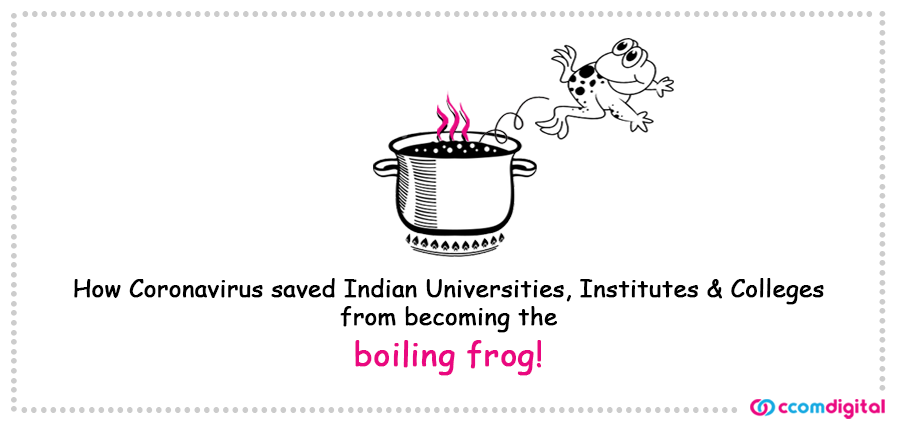
All of you must have heard the fable of the boiling frog. The fable describes a frog being slowly boiled alive. The premise of the fable is that if the frog is put suddenly into boiling water, it will jump out, but if the frog is put in tepid water which is then brought to a boil slowly, the frog will not perceive the danger and will be cooked to death.
We are telling the fable of the boiling frog because it is used as a metaphor for the inability or unwillingness of people, institutions or governments to perceive the threats or changes that gradually arrive rather than suddenly. And the fable applies perfectly to India’s education system as well. In this case, the education institutes are the frogs. The water they are in was being slowly brought to boil, but the education institutes had been unable to perceive the changes that have been sweeping the industry. Now interestingly, the coronavirus pandemic changed this equation. The coronavirus pandemic has brought the water to a sudden boil and all the institutes, colleges, and academies have jumped out.
Ever since the start of this millenium, the Indian education environment has always been changing. From the rise of distance learning programs to learning in remote classrooms powered by video satellite communication – the Indian education system has absorbed these changes, but the overall environment hasn’t changed much. But the environment has changed dynamically & disruptively with affordable smartphones and cheap data.
Before smartphones, education was a seller’s market. There was not much need for colleges & institutions to market themselves. Yes they needed visibility, but they never focussed on attracting students. But with smartphones & data, education has become a buyer’s market. Colleges & institutions are in need to not just market themselves, but do it so effectively that they become the preferred choice for the student. Edtech companies like UpGrad, Unacademy, Udemy, Vedantu etc. were the first to see these changes. They recognised that there has been a generational shift of the consumer; millennials are done with their education and it’s the GenZers who make up the market now.
GenZers seek experiences that are genuine. And this applies to their view of education as well. GenZers don’t look only at degrees, but rather the skill sets they will learn and the jobs that they can get by completing it. Moreover, GenZers have never seen a world without the internet. They were born into a world of communication and apps. All of this meant that it was time to serve education the way the GenZers expected it.
The edtech companies have been pioneering this change by not just building great digital tech platforms, but also by marketing themselves brilliantly on all digital platforms. Their foresight has enabled each of these companies to build a captive learning student database of lacs. Ever since the coronavirus pandemic hit India, all education institutes and colleges got affected, but the business at edtech companies has been booming.
But with the water now suddenly boiling, the frog has jumped out. Universities, institutes and colleges have realised that they need to undergo a digital transformation – beginning with how they market themselves to how they deliver education. We call this Education Revolution 2.0
A digital transformation is certainly overwhelming, but it is what we excel at. If you are a university, institute, college or an academy, hit reply and we’ll get started with your digital transformation immediately.